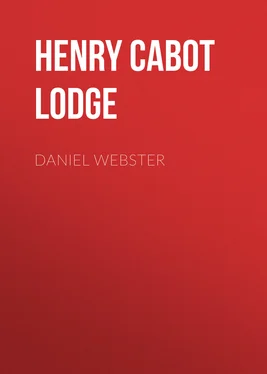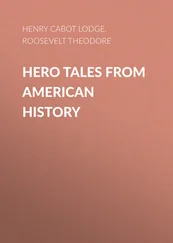Henry Cabot Lodge - Daniel Webster
Здесь есть возможность читать онлайн «Henry Cabot Lodge - Daniel Webster» — ознакомительный отрывок электронной книги совершенно бесплатно, а после прочтения отрывка купить полную версию. В некоторых случаях можно слушать аудио, скачать через торрент в формате fb2 и присутствует краткое содержание. Жанр: Биографии и Мемуары, История, foreign_edu, foreign_antique, foreign_prose, на английском языке. Описание произведения, (предисловие) а так же отзывы посетителей доступны на портале библиотеки ЛибКат.
- Название:Daniel Webster
- Автор:
- Жанр:
- Год:неизвестен
- ISBN:нет данных
- Рейтинг книги:5 / 5. Голосов: 1
-
Избранное:Добавить в избранное
- Отзывы:
-
Ваша оценка:
- 100
- 1
- 2
- 3
- 4
- 5
Daniel Webster: краткое содержание, описание и аннотация
Предлагаем к чтению аннотацию, описание, краткое содержание или предисловие (зависит от того, что написал сам автор книги «Daniel Webster»). Если вы не нашли необходимую информацию о книге — напишите в комментариях, мы постараемся отыскать её.
Daniel Webster — читать онлайн ознакомительный отрывок
Ниже представлен текст книги, разбитый по страницам. Система сохранения места последней прочитанной страницы, позволяет с удобством читать онлайн бесплатно книгу «Daniel Webster», без необходимости каждый раз заново искать на чём Вы остановились. Поставьте закладку, и сможете в любой момент перейти на страницу, на которой закончили чтение.
Интервал:
Закладка:
There was one lawyer, however, at the head of his profession in New Hampshire, who had more effect upon Mr. Webster than any other whom he ever met there or elsewhere. This was the man to whom the Shaker said: "By thy size and thy language 1 1 Mr. Mason, as is well known, was six feet seven inches in height, and his language, always very forcible and direct, was, when he was irritated, if we may trust tradition, at times somewhat profane.
I judge that thou art Jeremiah Mason." Mr. Mason was one of the greatest common-lawyers this country has ever produced. Keen and penetrating in intellect, he was master of a relentless logic and of a style which, though simple and homely, was clear and correct to the last point. Slow and deliberate in his movements, and sententious in his utterances, he dealt so powerfully with evidence and so lucidly with principles of law that he rarely failed to carry conviction to his hearers. He was particularly renowned for his success in getting verdicts. Many years afterwards Mr. Webster gave it as his deliberate opinion that he had never met with a stronger intellect, a mind of more native resources or quicker and deeper vision than were possessed by Mr. Mason, whom in mental reach and grasp and in closeness of reasoning he would not allow to be second even to Chief Justice Marshall. Mr. Mason on his side, with his usual sagacity, at once detected the great talents of Mr. Webster. In the first case where they were opposed, a murder trial, Mr. Webster took the place of the Attorney-General for the prosecution. Mr. Mason, speaking of the impression made by his youthful and then unknown opponent, said:—
"He broke upon me like a thunder shower in July, sudden, portentous, sweeping all before it. It was the first case in which he appeared at our bar; a criminal prosecution in which I had arranged a very pretty defence, as against the Attorney-General, Atkinson, who was able enough in his way, but whom I knew very well how to take. Atkinson being absent, Webster conducted the case for him, and turned, in the most masterly manner, the line of my defences, carrying with him all but one of the jurors, so that I barely saved my client by my best exertions. I was nevermore surprised than by this remarkable exhibition of unexpected power. It surpassed, in some respects, anything which I have ever since seen even in him."
With all his admiration for his young antagonist, however, one cannot help noticing that the generous and modest but astute counsel for the defence ended by winning his case.
Fortune showered many favors upon Mr. Webster, but none more valuable than that of having Jeremiah Mason as his chief opponent at the New Hampshire bar. Mr. Mason had no spark of envy in his composition. He not only regarded with pleasure the great abilities of Mr. Webster, but he watched with kindly interest the rapid rise which soon made this stranger from the country his principal competitor and the champion commonly chosen to meet him in the courts. He gave Mr. Webster his friendship, staunch and unvarying, until his death; he gave freely also of his wisdom and experience in advice and counsel. Best of all was the opportunity of instruction and discipline which Mr. Webster gained by repeated contests with such a man. The strong qualities of Mr. Webster's mind rapidly developed by constant practice and under such influences. He showed more and more in every case his wonderful instinct for seizing on the very heart of a question, and for extricating the essential points from the midst of confused details and clashing arguments. He displayed, too, more strongly every day his capacity for close, logical reasoning and for telling retort, backed by a passion and energy none the less effective from being but slowly called into activity. In a word, the unequalled power of stating facts or principles, which was the predominant quality of Mr. Webster's genius, grew steadily with a vigorous vitality while his eloquence developed in a similar striking fashion. Much of this growth and improvement was due to the sharp competition and bright example of Mr. Mason. But the best lesson that Mr. Webster learned from his wary yet daring antagonist was in regard to style. When he saw Mr. Mason go close to the jury box, and in a plain style and conversational manner, force conviction upon his hearers, and carry off verdict after verdict, Mr. Webster felt as he had never done before the defects of his own modes of expression. His florid phrases looked rather mean, insincere, and tasteless, besides being weak and ineffective. From that time he began to study simplicity and directness, which ended in the perfection of a style unsurpassed in modern oratory. The years of Mr. Webster's professional life in Portsmouth under the tuition of Mr. Mason were of inestimable service to him.
Early in this period, also, Mr. Webster gave up his bachelor existence, and made for himself a home. When he first appeared at church in Portsmouth the minister's daughter noted and remembered his striking features and look, and regarded him as one with great capacities for good or evil. But the interesting stranger was not destined to fall a victim to any of the young ladies of Portsmouth. In the spring of 1808 he slipped away from his new friends and returned to Salisbury, where, in May, he was married. The bride he brought back to Portsmouth was Grace Fletcher, daughter of the minister of Hopkinton. Mr. Webster is said to have seen her first at church in Salisbury, whither she came on horseback in a tight-fitting black velvet dress, and looking, as he said, "like an angel." She was certainly a very lovely and charming woman, of delicate and refined sensibilities and bright and sympathetic mind. She was a devoted wife, the object of her husband's first and strongest love, and the mother of his children. It is very pleasant to look at Mr. Webster in his home during these early years of his married life. It was a happy, innocent, untroubled time. He was advancing in his profession, winning fame and respect, earning a sufficient income, blessed in his domestic relations, and with his children growing up about him. He was social by nature, and very popular everywhere. Genial and affectionate in disposition, he attached everybody to him, and his hearty humor, love of mimicry, and fund of anecdote made him a delightful companion, and led Mr. Mason to say that the stage had lost a great actor in Webster.
But while he was thus enjoying professional success and the contented happiness of his fireside, he was slowly but surely drifting into the current of politics, whither his genius led him, and which had for him an irresistible attraction. Mr. Webster took both his politics and his religion from his father, and does not appear to have questioned either. He had a peculiarly conservative cast of mind. In an age of revolution and scepticism he showed no trace of the questioning spirit which then prevailed. Even in his earliest years he was a firm believer in existing institutions, in what was fixed and established. He had a little of the disposition of Lord Thurlow, who, when asked by a dissenter why, being a notorious free-thinker, he so ardently supported the Established Church, replied: "I support the Church of England because it is established. Establish your religion, and I'll support that." But if Mr. Webster took his religion and politics from his father in an unquestioning spirit, he accepted them in a mild form. He was a liberal Federalist because he had a wide mental vision, and by nature took broad views of everything. His father, on the other hand, was a rigid, intolerant Federalist of a thorough-going Puritan type. Being taken ill once in a town of Democratic proclivities, he begged to be carried home. "I was born a Federalist," he said, "I have lived a Federalist, and I won't die in a Democratic town." In the same way Ezekiel Webster's uncompromising Federalism shut him out from political preferment, and he would never modify his principles one jot in order to gain the seat in Congress which he might easily have obtained by slight concessions. The broad and liberal spirit of Daniel Webster rose superior to the rigid and even narrow opinions of his father and brother, but perhaps it would have been better for him if he had had in addition to his splendid mind the stern, unbending force of character which made his father and brother stand by their principles with immovable Puritan determination. Liberal as he was, however, in his political opinions, the same conservative spirit which led him to adopt his creed made him sustain it faithfully and constantly when he had once accepted it. He was a steady and trusted party man, although neither then nor at any time a blind, unreasoning partisan.
Читать дальшеИнтервал:
Закладка:
Похожие книги на «Daniel Webster»
Представляем Вашему вниманию похожие книги на «Daniel Webster» списком для выбора. Мы отобрали схожую по названию и смыслу литературу в надежде предоставить читателям больше вариантов отыскать новые, интересные, ещё непрочитанные произведения.
Обсуждение, отзывы о книге «Daniel Webster» и просто собственные мнения читателей. Оставьте ваши комментарии, напишите, что Вы думаете о произведении, его смысле или главных героях. Укажите что конкретно понравилось, а что нет, и почему Вы так считаете.












